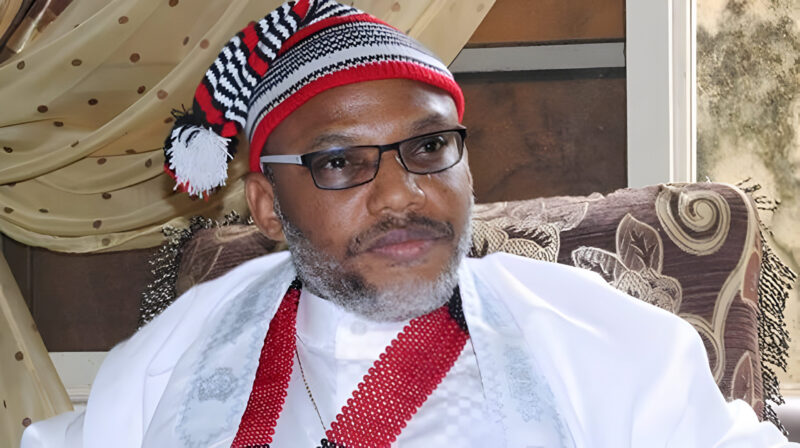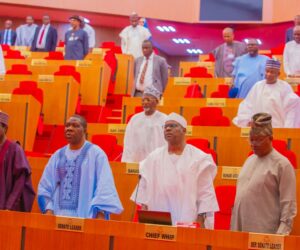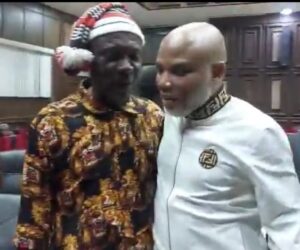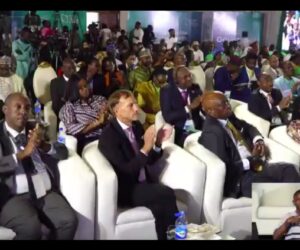Judge James Omotosho of the Federal High Court in Abuja on Tuesday gave Biafra nation agitator, Nnamdi Kanu, 24 hours to open his defence in his terrorism trial or waive his right to do so.
Mr Omotosho, who adjourned hearing till Wednesday for Mr Kanu to make his stance known, reiterated his previous advice to the secessionist leader to consult lawyers conversant with criminal laws to aid his defence or opt for a lawyer to handle his case.
The judge rescheduled the hearing to Wednesday after Mr Kanu held his ground that the terrorism charges against him were illegal and that there was no valid charge against him.
Tuesday’s hearing is the latest episode in the back-and-forth that has played out in court over Mr Kanu’s defence in the last few weeks, prompting the judge to severally reschedule proceedings for the Biafra agitator to present his defence.
The Nigerian government is prosecuting Mr Kanu on seven charges, mostly terrorism-related, that stemmed from his alleged violent secessionist campaigns for the independence of the Igbo-dominated South-eastern part of Nigeria and some neighbouring places as Biafra.
Mr Kanu, a dual citizen of Nigeria and the United Kingdom who leads the now proscribed Indigenous People of Biafra (IPOB), has consistently denied any wrongdoing, maintaining on different occasions that he had the right to self-determination.
Unending battle
The case has been on since 2015. It was interrupted for about three years due to Mr Kanu’s disappearance from the country following soldiers’ attack on his home in Abia State in September 2017.
The prosecution closed its case in June this year, after which Mr Kanu filed a no-case submission that was dismissed.
Following the ruling, he filed a motion he personally signed on 21 October, listing serving and retired public officers, alongside unnamed individuals, as proposed defence witnesses.
He said he planned to call 23 witnesses, divided into “ordinary but material witnesses” and “vital and compellable” ones, to be summoned under Section 232 of the Evidence Act, 2011. He also asked for 90 days to conclude his defence.
At the hearing on 23 October, scheduled for him to open his defence, Mr Kanu announced the disengagement of his legal team led by former Attorney-General of the Federation, Kanu Agabi, a Senior Advocate of Nigeria (SAN). He told the court he would defend himself, prompting the judge to adjourn until the following day.
When the matter resumed on 24 October, he said he could not proceed with his defence because he had yet to retrieve his case file from his sacked lawyers. The judge reluctantly adjourned till Monday, 27 October.
At the rescheduled hearing, however, Mr Kanu said he had reviewed the prosecution’s case and found it “not worth defending.” He told the court that there was “no extant law in this country upon which the prosecution can predicate the charges,” adding that he would not enter a defence in a charge “that does not exist under any Nigerian law.”
The judge then directed him to file a written address to that effect and have it served on the prosecution. The judge also advised him to consult criminal law experts on the implications of his decision. Mr Omotosho then fixed 4, 5 and 6 November for further proceedings.
However, on 30 October, Mr Kanu filed a fresh application for the striking out of the terrorism charges, urging the trial judge to order his release from custody.
The application, titled “Motion on Notice and Written Address in Support,” re-echoed the points he earlier made during proceedings Monday, when he told the judge that he had no reason to file any defence in his case because there was no valid charge against him.
Tuesday proceedings
At Tuesday’s proceedings, lawyer to the federal government, Adegboyega Awomolo, a Senior Advocate of Nigeria (SAN), drew the attention of the court to some documents served on him by Mr Kanu.
He told the court that the documents are worthless and have no probative value because they were not signed and endorsed by the court.
He urged the court to discountenance the documents and permit him to adopt his final address and fix a date for judgement.
But the judge overruled him, saying the documents in the court records are signed with evidence of payment.
Mr Kanu, who announced appearance for himself on Tuesday, told the court that he would not go back to detention unless the charges against him are clearly shown to him.
Mr Kanu maintained that his detention at the facility of the State Security Service (SSS) was illegal and unlawful because there was no known law he had breached.
He accused the court of violating the Supreme Court judgement that condemned his extraordinary rendition from Kenya and demanded that the judge must immediately discharge him.
When reminded that the Supreme Court remitted the case for fresh trial, he maintained that the terrorism charge against him was incompetent, invalid and illegal.
Citing Section 36(12) of the Nigerian Constitution, Mr Kanu said there was no written law on terrorism offences in Nigeria, hence there was nothing for him to defend.
“In Nigeria today, the Constitution is the supreme law. There is no provision for terrorism offence in the Constitution. There is no valid charge against me. I will not go back to any detention today.
“Terrorism Prevention and Prohibition Act has been repealed. I cannot put in defence under a repealed law. I will not do that.
“Tell any lawyer to show me the valid charge. I appeal to you to please take judicial notice of the repeal of the terrorism law. I am not ready to go back to detention today unless I am shown the valid charge against me.
“I cannot be tried under a law that has been repealed. A law that is not written in our Constitution. Prosecuting me under a repealed law is a violation of my fundamental right,” he said repeatedly.
After much persuasion and his insistence not to defend the charge, Judge Omotosho adjourned further hearing till Wednesday for Mr Kanu to either enter his defence or waive his right to do so.










